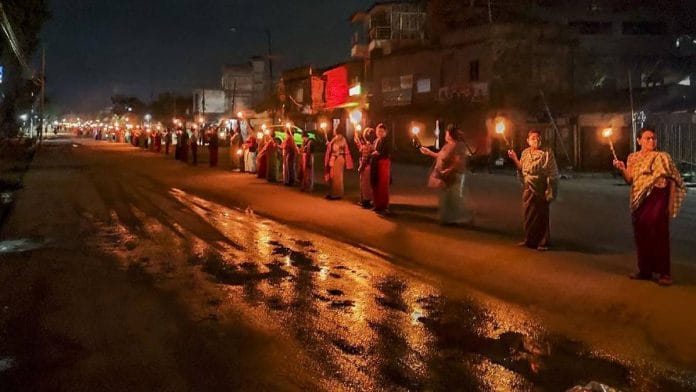Imphal/Guwahati: The Manipur ethnic conflict is far from being over, with every plan of the state’s N. Biren Singh-led BJP government seemingly failing to restore normalcy.
New strategies have started to look insufficient under challenging conditions, with people and civil society organisations (CSOs) on each side sticking to their demands — Kuki-Zomi tribals seeking a separate administration in the state, and the majority Meiteis demanding protection of ‘Manipur’s territorial integrity’.
Last month, CM Biren Singh highlighted the existence of “too many” CSOs in the state, functioning at different levels, and “without a common aspiration”.
“Let there be no confusion in the state. Let there be a single voice of the people. The number of CSOs and groups are too many,” Singh had said at the ‘Meri Maati Mera Desh’ event on 31 August in Imphal. “Let us fight the challenges collectively. Any internal bickering or conflict will only serve the adversary’s interest.”
Speaking to ThePrint, Somorendro Thokchom, media coordinator for the Coordinating Committee on Manipur Integrity (COCOMI), the apex body of the Meitei community, termed the CM’s remark on CSOs “pointless”.
“He should be focussing on solving the crisis and protecting Manipur in consonance with the demands of CSOs,” Thokchom said.
While acknowledging that many CSOs exist in Manipur, Thokchom clarified that regardless of the number, all were “pursuing the same end”.
“In the present context, all the Meitei CSOs are safeguarding Manipur’s territorial integrity and boundary. Besides, they are demanding to root out narco-terrorists and revoke SoO (Suspension of Operations agreement) with Kuki militants, among other things, to bring a permanent solution to the crisis,” he said.
The COCOMI was formed in 2019 and comprises about 50 existing CSOs and organisations, he explained.
Meanwhile, Ginza Vualzong, spokesman for the Indigenous Tribal Leaders’ Forum (ITLF), a conglomerate of recognised tribes in ‘Lamka’ (Churachandpur district), said that all Kuki CSOs have one demand — a separate administration.
“Indeed, there are many CSOs, but our demand is one. Just like there were many political groups during the India Freedom Movement, we too have several organisations. What matters is that we are united in our political demand. As of now each CSO is a stakeholder,” he said.
Also Read: ‘They came with 6 JCBs’— How eviction of a tiny village sparked fires across Manipur
‘Incompetency & dismal failure on all fronts’
The Manipur government’s inability to find a solution was also pointed out by other Meitei and Kuki organisations.
Simon Mangang, general secretary of Meitei Ireicha Kamba Athouba Salai (MIKAS 7), told ThePrint that around 30 new CSOs had been formed in the first three months of the conflict, mainly because the state government “failed to fulfil the needs of the people on any issue”.
MIKAS 7 was formed on 4 May, a day after ethnic clashes broke out in Manipur. The new group is identified as an apex body of the Manipur Youth Development Organisation that was established in 2020.
“The Meitei- Kuki ethnic strain is nothing new, it’s an issue (going on for) over a decade now. Yes, there are many CSOs in Manipur, but the government needs to solve the problem and not keep CSOs waiting. In that case, any CSO can be approached, and even without talking to the organisations, the government can resolve the crisis, if it wants,” said Mangang.
On the other hand, Khaikohauh Gangte, secretary of Kuki Inpi Manipur (KIM), an apex body of Kuki tribes, said CM Singh’s statement on CSOs “proves his incompetency and dismal failure on all fronts”.
“By saying that there are too many groups in Manipur, N. Biren Singh is referring to the Meitei civil society organisations, and not the Kukis,” said Gangte. “Facing insurmountable pressure from the Meitei community vis-a-vis the failure of his government in handling the crisis, he simply accused his people and concluded that there are too many CSO groups in Manipur.”
He further slammed the CM for “narratives targeting an entire community”.
“Unsurprisingly, his narrative keeps on changing as the crisis deepens. In the initial stage, he propagated and popularised the ‘war on illegal immigrants’. Midway, he made a clarion call for launching a ‘war on Kuki militants’ under SoO (Suspension of Operations agreement). Of late, he has manufactured the narrative of ‘war on Chin-Kuki narco-terrorists’,” he said.
“All his narratives are nothing but a mischievous ploy to conceal his pogrom against the Kukis,” Gangte added.
The KIM, Gangte explained, represents “all Kuki tribes” and is derived from the traditional form of governance of the Kukis.
“The Kuki Inpi got rejuvenated and gained momentum in the early 1990s. Every Kuki village had been administered under one socio-political unit, called Kuki Inpi. And its structural hierarchy ranges from village level to block level, from block level to district level, from district level to state level. Kuki Inpi is the unified command that brings them all together,” he said.
CSOs for Manipur’s many challenges
Unresolved conflicts, insecurity, insurgency, drugs, corruption and violation of human rights are some of the major challenges Manipur has struggled with. Successive governments have long tried to deal with these issues, with huge expense of time and money, but have rarely been successful.
The state saw the birth of CSOs solely dedicated to pursue particular demands — like the Manipur People Against Citizenship (Amendment) Bill (now Act) or MANPAC formed solely to oppose the law in Manipur. Similarly, other bodies like the Joint Committee on Inner Line Permit System (JCILPS) and the Scheduled Tribe Demand Committee of Manipur (STDCM) were formed.
When it comes to demands by CSOs, even the apex body of the Nagas in Manipur, the United Naga Council (UNC), as well as the COCOMI, had repeatedly raised demands for implementation of the National Register of Citizens in Manipur.
(Edited by Nida Fatima Siddiqui)






